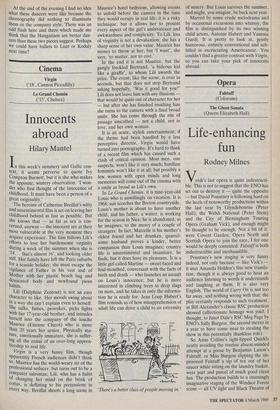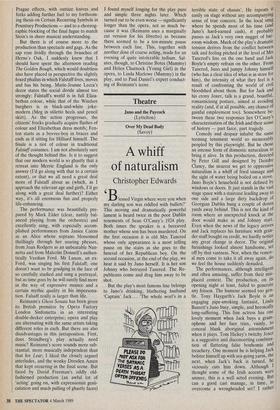Opera
Falstaff (Coliseum) The Ghost Sonata (Queen Elizabeth Hall)
Life-enhancing fun
Rodney Milnes
Verdi'se last opera is quite indestructi- ble. This is not to suggest that the ENO has set out to destroy it — quite the opposite — but David Pountney is following hard on the heels of noteworthy productions within the last year by Glyndebourne (Peter Hall), the Welsh National (Peter Stein) and the City of Birmingham Touring Opera (Graham Vick), and enough might be thought to be enough. Not a bit of it: were Covent Garden, Opera North and Scottish Opera to join the race, I for one would be deeply contented. Falstaff is both indestructible and inexhaustible.
Pountney's new staging is very funny indeed, not only because — like Vick's it uses Amanda Holden's fine new transla- tion, though it is always good to hear an audience listening to words it understands and laughing at them. It is also very English. The world of Carry On is not too far away, and nothing wrong with that: the play certainly responds to such treatment, as Bill Alexander's classic RSC production showed (affectionate homage was paid, I thought, to Janet Dale's RSC Meg Page by ENO's Sally Burgess, the second mezzo in a year to have come near to stealing the show in this potentially thankless role).
So Anne Collins's tight-lipped Quickly neatly avoiding the routine absent-minded attempt at a goose by Benjamin Luxon's Falstaff, or Miss Burgess slipping the im- prisoned Falstaff a sip of tea out of her saucer while sitting on the laundry basket, were part and parcel of much good clean fun. The production builds to a stunningly imaginative staging of the Windsor Forest scene — all UV light and Black Theatre of Prague effects, with outsize knives and forks adding further fuel to my forthcom- ing thesiS on Certain Recurring Symbols in Pountney Productions — and to a choreog- raphic blocking of the final fugue to match Stein's in sheer musical understanding.
But there is of course more to the production than spectacle and gags. As the sap rose lividly through the branches of Herne's Oak, I suddenly knew that I should have spent the afternoon reading The Golden Bough, which would doubtless also have placed in perspective the slightly foxed phallus in which Falstaff lives, moves and has his being. Marie-Jeanne Lecca's decor states the social divide almOst too strongly: Falstaff's world is in full Eliza- bethan colour, while that of the Windsor burghers is in black-and-white joke- modern (Meg in stiletto heels and pencil skirt). As the action progresses, the citizens' frocks gradually acquire flashes of colour and Elizabethan dress motifs; Fen- ton starts as a bovver-boy in braces and ends as if sitting for Hilliard himself. The finale is a riot of colour in traditional Falstaff costumes. I am not absolutely sure of the thought behind this. Is it to suggest that our modern world is so ghastly that a retreat into Merrie England is the only answer (I'd go along with that to a certain extent), or that we all need a great deal more of Falstaff about us (which, as I approach the relevant age and girth, I'd go along with a great deal further)? Either way, it's all enormous fun and properly life-enhancing.
The performance was beautifully pre- pared by Mark Elder (clear, nattily bal- anced playing from the orchestra) and excellently sung, with especially accom- plished performances from Janice Cairns as an Alice whose soprano blossomed thrillingly through her soaring phrases, from Joan. Rodgers as an unbeatable Nan- netta and from Malcolm Donnell's authen- tically Verdian Ford. Mr Luxon, an ex- Ford, was singing his first Falstaff; one doesn't want to be grudging in the face of so carefully studied and sung a portrayal, but as time goes by he will surely find more in the way of expressive nuance and a certain mythic quality in his impersona- tion. Falsaff really is larger than life.
Reimann's Ghost Sonata has been given its British premiere by Opera Factory London Sinfonietta in an interesting double-decker enterprise; opera and play are alternating with the same artists taking different roles in each. But there are also disadvantages in this juxtaposition. First, does Strindberg's play actually need music? Reimann's score sounds mote sub- stantial, more musically independent than that for Lear; I liked the closely argued interludes, and the wonky Dresden Amen that kept recurring in the final scene. But faced by David Freeman's oddly old- fashioned production (an awful lot of `acting' going on, with expressionik gesti- culation and much pulling of ghastly faces) I found myself longing for the play pure and simple three nights later. Which turned out to be even worse— significantly longer than the opera, not so much be- cause it was (Reimann uses a marginally cut version for his, libretto) as becauSe there seemed to be a ten-minute pause between each line. This, together with another dose of coarse acting, made for an evening of quite intolerable tedium. Sal- utes, though, to Christine Botes (Mummy) and Helen Charnock (Young Girl) in the opera, to Linda Marlowe (Mummy) in the play, and to Paul Daniel's expert conduct- ing of Reimann's score.

















































 Previous page
Previous page